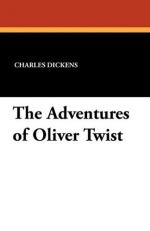|
This section contains 1,207 words (approx. 5 pages at 300 words per page) |

|
Analysis of Fagin's Last Night Alive in "Oliver Twist"
Summary: Essay provides an analysis of Fagin's last night alive" in Charles Dickens' "Oliver Twist."
Combining entertainment with a deep critique of the contemporary socioeconomic system and philosophy, Charles Dickens' Oliver Twist explores the reality that in Victorian London, crime was neither heroic nor romantic. A setting of debauchery, thievery, prostitution, and murder, Fagin's underworld didactically illustrates the "unattractive and repulsive truth (36)," that one's environment--not birth--influences character. Attempting to introduce society to the evil it had created, Dickens penned "Fagin's Last Night Alive," manipulating both his literal and figurative audience, capitalizing on the current sentiments and issues. By typifying Fagin as the absolute evil, Dickens uses contemporary religious temperaments and society's apathy and ignorance, to reveal a reality about the underworld lifestyle that society was not willing to acknowledge--society is somewhat guilty for the underworld's corruption.
Distant, detached, and ignorant of society's degenerate condition, the developing society feared reality's ugliness. Believing that decadence encouraged decadence and that one's birth influenced one's character, society...
|
This section contains 1,207 words (approx. 5 pages at 300 words per page) |

|


